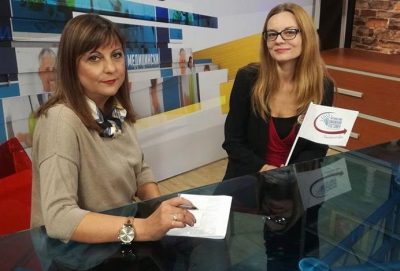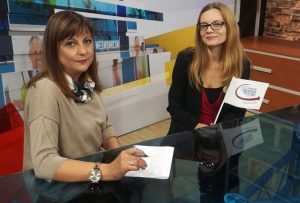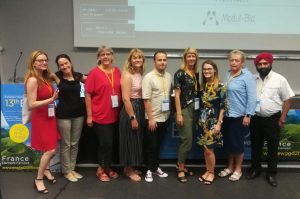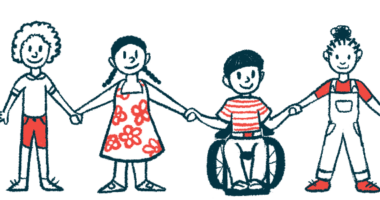Macedonian Gaucher Activist Publicizes Plight of Rare Disease Patients

Vesna Aleksovska prepares for an interview with Zaklina Mucheva in Skopje, Macedonia. (Photo courtesy of Alpha TV.)
The challenges Vesna Aleksovska faced when she decided a decade ago to help fellow Macedonians with rare diseases were so daunting, they would have scared off all but the most determined.
At that time, few doctors in the developing country of 2 million — now called North Macedonia — had expertise in even one of the world’s 7,000 rare conditions. Nor were newborns screened for genetic conditions in those days, said Aleksovska, who was diagnosed with Gaucher disease at the age of 7.
Gaucher symptoms include an enlarged liver and spleen, a decrease in red blood cells, and weakened bones.
“Ten years ago, the Health Ministry had no idea how many rare disease patients were in Macedonia or what diseases they had, because there was no patient registry,” said Aleksovska, chair of the International Gaucher Alliance and president of Macedonia’s rare disease organization, Life With Challenges. “In fact, one health minister during that time refused to meet with the rare disease community or even answer our letters.”
Meanwhile, the national health insurance fund was covering few rare disease treatments, or patients’ equipment needs. So Aleksovska decided that her first priority in starting Life With Challenges in 2009 had to be jolting healthcare officials out of their complacency.
She knew the power of the strategy she’d pursue — going to the media — because she already had 10 years of experience in journalism.
“I had the perfect background,” she told Bionews Services — which publishes this website — during a June conference in Struga, Macedonia. “I started in print, went into online news, then radio, then television, and finally became a TV talk show host.”
‘We needed brave people’
Aleksovska, 34, was sure that compelling storytelling could build public and government support for rare disease patients faster and more effectively than other approaches.
When she started Life With Challenges, the health insurance fund wouldn’t cover the Gaucher treatment Cerezyme (imiglucerase) on the grounds that it was too costly. Aleksovska and three other Macedonians were getting it only because its manufacturer, Sanofi-Aventis — now called Sanofi Genzyme — made it available under a special program for patients with critical needs and limited resources.
Aleksovska vowed to obtain treatment coverage not just for Gaucher, but for all rare conditions. Yet many people with rare diseases were reluctant to share their deeply personal stories to gain the attention they needed from healthcare officials.
“We needed brave people in the community to talk about the problems they faced, and the fact that they were getting no help,” she said.
A vanguard of four storytellers — herself included — held their first press conference in 2012, along with Aco Kostovski, MD, the renowned director of the national Children’s Clinic in Skopje, the capital.
Although Aleksovska was a seasoned journalist, she said, “I found myself shaking at that event.”
But the payoff was huge. Journalists covering it spotlighted the community’s needs in a way that had never been done, attracting public and government attention. The publicity prompted patients from around the country to contact Life With Challenges.
Engaging high-profile experts
The ranks of the storytellers grew to cover a dozen or more rare diseases, including spinal muscular atrophy, pulmonary hypertension, Huntington’s disease, and Alport syndrome.
Aleksovska also popped in — brassy-journalist style — to events the health and finance ministers, and prime minister were attending to ask why nothing was being done for the rare disease community.
Besides holding press conferences, she and the other storytellers gave interviews to newspapers and appeared on TV and talk shows.
One of them, Dragan Dimitrijoski, briefed the journalists on his 6-year-old son, Viktor, who has phenylketonuria, or PKU. The genetic disorder’s symptoms include delayed development, neurological disorders, skin rashes, and intellectual and psychiatric problems.
As the reporters took notes and the cameras whirred, Dimitrijoski described his exasperation that “treatments for PKU had been around for decades, but none was available in Macedonia.”
In addition to reporters, Aleksovska wooed global health experts and notables at home and abroad. They included Jaroslaw Waligora, the European Union’s health advisor to Macedonia; Mary Jo Wohlers, wife of Paul Wohlers, the U.S. ambassador from 2011 to 2014; and Maja Ivanova, wife of Macedonian President Gjorge Ivanov.
Within three years, this formula led to pledges of help from then-Health Minister Nikola Todorov; the head of the insurance fund, Maja Parnardzieva Zmejkovska; and then-Prime Minister Nicola Gruevski.
The Health Ministry eventually created a patient registry that now includes 450 names and 80 conditions.
More public awareness
In 2014, the insurance fund began paying for many of the special foods crucial to treating a number of rare diseases. This included the diet that Dimitrijoski’s son Viktor needed for his PKU.
The following year, the fund began covering rare disease drugs, including Cerezyme, the Gaucher medicine it had once denied Aleksovska. The medicine has returned her health to near-normal, she said; these days, her only symptom is fatigue. And in 2016, health officials agreed to boost the budget for special foods, medicines, and equipment for rare diseases.
Venko Filipce, who became health minister in 2018, has continued the momentum, talking with more patient organizations and more rare disease medical specialists than his predecessors, Aleksovska said.
Seven years after Life With Challenges began working with journalists to tell members’ stories, public awareness of — and support for helping — people with rare diseases has soared. And the Health Ministry has gone from ignoring the community to partnering to help rare disease patients and caregivers.
Yet much remains to be done.
Aleksovska continues to urge rare disease families to speak out and fight for their rights. Community leaders say that without her determination and ability to make things happen, progress would not have occurred.
“Thanks to Vesna, a lot of children with rare diseases are getting the special food and medicine they need to save their lives,” said Dimitrijoski, who moved to Sweden four years ago so Viktor would have access to a PBK specialist and other resources. “She is a tireless fighter and a true hero.”









